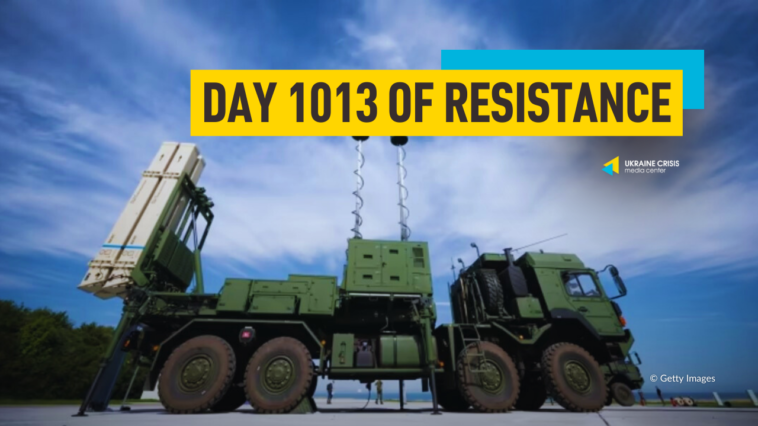Ukraine will get another IRIS-T system, Patriot launchers this month, Scholz says. NATO countries are expected to reaffirm support for Ukraine at the NATO foreign ministers’ meeting in Brussels. Ukraine condemns violence against the protesters in Georgia, responds to allegations.
Ukraine to get another IRIS-T system, Patriot launchers this month, Scholz says
Germany will send Ukraine another IRIS-T air defense system, launchers for Patriot air defense systems and more Gepard self-propelled anti-aircraft guns this month, German Chancellor Olaf Scholz told a joint news conference in Kyiv on Monday with Ukrainian President Volodymyr Zelenskyi.
Germany has already supplied five IRIS-T systems, three Patriot systems, and over 50 Gepards, Scholz said.
Scholz promised to deliver more air defense systems, howitzers, drones for strike and surveillance purposes, as well as Sea King helicopters to Ukraine in 2025.
Scholz said his visit to Kyiv sent a message to Russian leader Vladimir Putin that Germany would stand by Ukraine for as long as needed in the war.
Zelenskyi said he had discussed with Scholz how to strengthen Ukraine’s air defenses.
German Chancellor Olaf Scholz arrived in Ukraine Monday for a surprise visit during which he announced further equipment deliveries worth EUR 650 million (approx. USD 683 million) by the year’s end.
The package includes IRIS-T air defense systems, Leopard 1 tanks and strike drones, a spokesperson for the German defense ministry earlier said.
NATO countries to reaffirm support for Ukraine at foreign ministers meeting in Brussels
The war situation and support for Ukraine will be high on the agenda at NATO foreign ministers meetings in Brussels on Tuesday and Wednesday, Ukrainian news web site European Pravda said Monday.
The NATO-Ukraine Council will meet at the NATO headquarters in Brussels. Ukraine is also expected to be in the spotlight during a meeting of the North Atlantic Council in foreign ministers’ session.
Mark Rutte will chair his first NATO Foreign Ministerial as Secretary General.
No formal written statement is expected to be issued at the meeting, but the Alliance will announce a joint stance on Ukraine support.
“We expect the ministers to reaffirm our unwavering support for Ukraine that continues to fight back against Russia’s brutal war of conquest, using the right guaranteed by the UN Charter,” an unnamed NATO official said, as translated from Ukrainian. “We also expect the ministers to address Russia’s hostile actions in NATO countries and confirm that they will not stop the members of the alliance from further support for Ukraine and from strengthening our defense,” the official told European Pravda.
NATO foreign ministers will also discuss the situation in the Middle East and its repercussions on Euro-Atlantic security.
Protests in Georgia were not on the agenda, but chances are high that they will be discussed at the participants’ request.
In an interview with Sky News last week, Zelenskyi suggested extending NATO’s Article 5 security guarantees initially to the parts of Ukraine under Kyiv’s control in an arrangement that still endorses the country’s internationally recognized borders, which marks a major shift in Ukraine’s policy.
A few days earlier, Ukrainian Foreign Minister Andriy Sybiha spoke with the U.S. Secretary of State Antony Blinken who will be in Brussels for the NATO Foreign Ministerial.
Ukraine condemns violence against protesters in Georgia, responds to allegations
In a statement on Monday, Ukraine’s Foreign Ministry strongly condemned the “human rights violations and the use of force against peaceful demonstrators in Georgia.” It also said the Georgian government should stop intimidating its people with warnings of a “Ukrainian scenario” repeating.
“The Georgian authorities must respect the fundamental right of their citizens to peaceful protest. Particularly, when the protests are driven by the government’s decision to halt Georgia’s progress towards EU membership, contrary to the European aspirations of the Georgian people,” the ministry said.
“We are perplexed by the Georgian government’s attempts to claim that the country’s European integration continues while its actions demonstrate a pivot toward Moscow. Ukrainian politicians who once sought to derail Ukraine’s path to the EU and steer it into Russia’s orbit similarly claimed they were merely ‘pausing’ rather than abandoning Ukraine’s European integration,” the statement reads.
“We strongly reject the persistent attempts of the Georgian authorities to involve Ukraine in internal political processes in their country. The Georgian government should stop intimidating its people with the myth of so-called ‘Ukrainian scenario’, while simultaneously implementing a ‘Belarusian scenario’ in practice.
“Ukraine has been and remains committed to democratic transformation in Georgia and its further European and Euro-Atlantic integration, which meets the interests of the Georgian people. In this context, we express solidarity with our Georgian diplomat colleagues who have publicly opposed the decision of the Georgian government to withdraw EU accession negotiations from the agenda,” the ministry said.
“We deeply understand the challenges faced by our Georgian colleagues, because in 2004 and 2014, at one of the most critical moments in Ukrainian history, the diplomatic service of Ukraine stood up for the democratic choice of the Ukrainian people, exemplifying professionalism, and civic courage,” it added.
“We are convinced that European integration is the key to stability, prosperity and strengthening of democratic institutions in Georgia, and we strive for a successful future for our peoples in the great European family. Our solidarity with the Georgian people remains unwavering,” the document reads.




